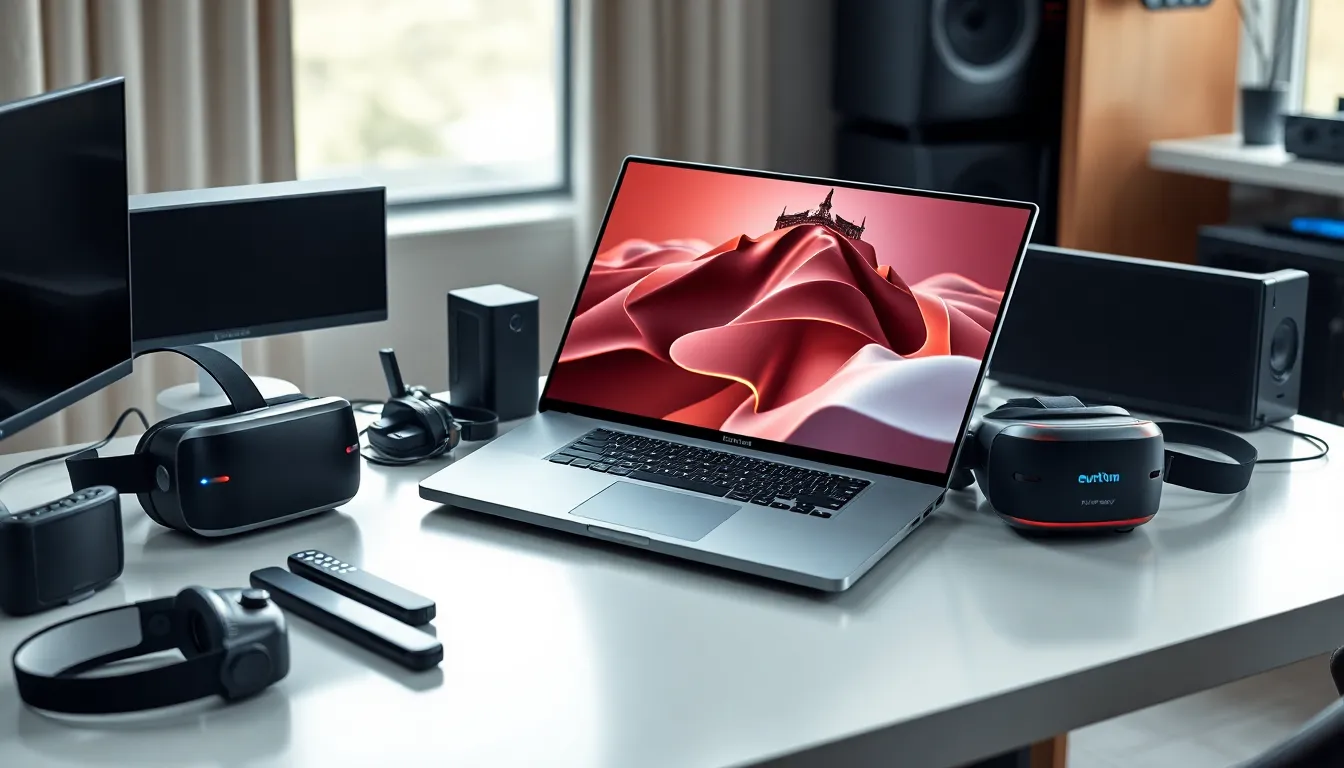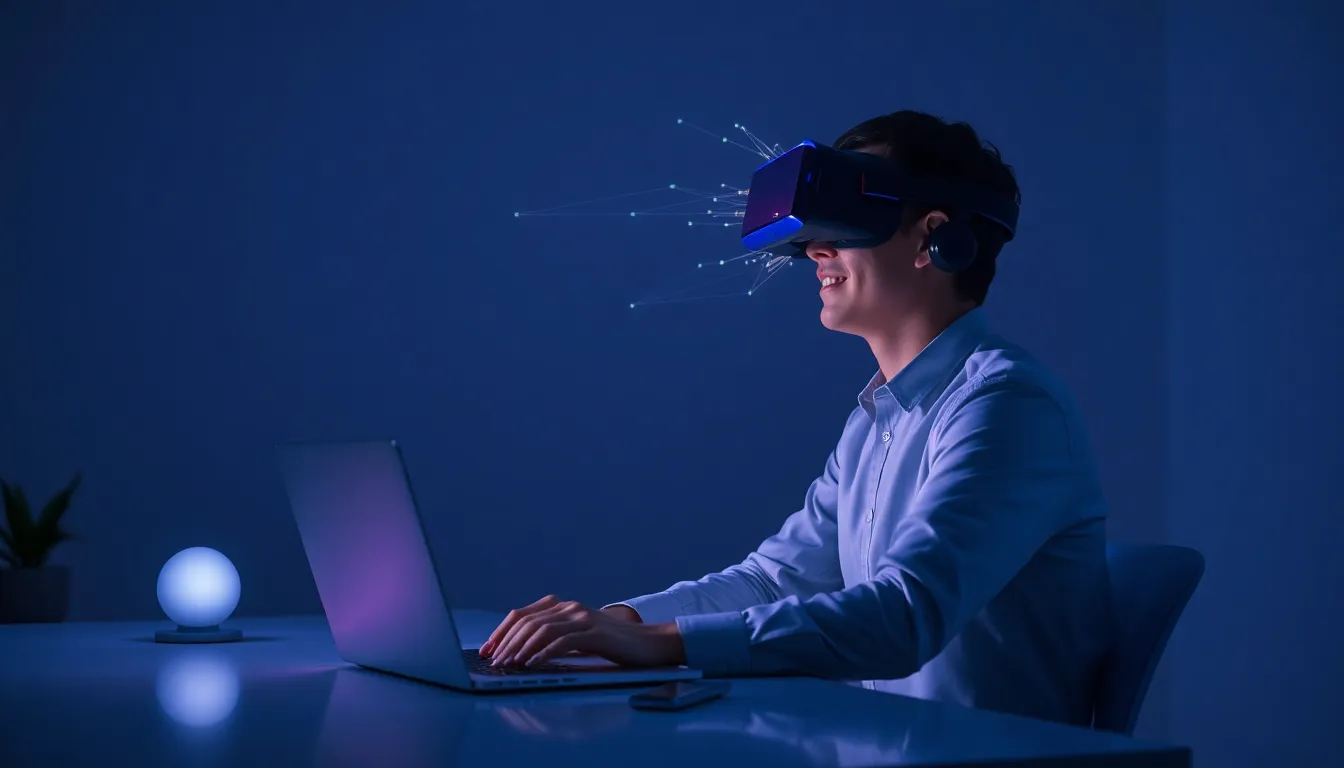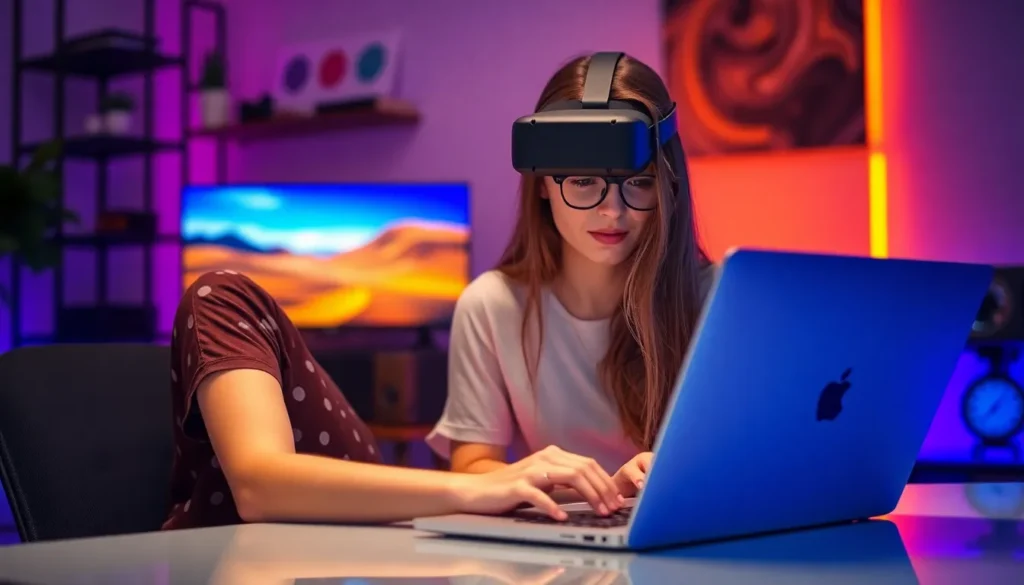Table of Contents
ToggleImagine diving into a virtual world where you can battle dragons, explore distant galaxies, or even attend a meeting without wearing pants. Welcome to the realm of VR laptops, where the lines between reality and imagination blur. These powerful machines are designed to deliver immersive experiences that’ll leave users questioning if they should ever return to the real world.
With cutting-edge technology and sleek designs, VR laptops are not just a trend; they’re the future of computing. Whether you’re a gamer seeking adrenaline-pumping adventures or a professional looking to revolutionize presentations, these laptops pack the punch you need. Get ready to upgrade your tech game and discover how VR laptops can transform the way you work and play. Who knew the future could be this fun?
What Is a VR Laptop?
A VR laptop combines advanced hardware and software to deliver immersive virtual reality experiences. These machines often feature high-performance graphics cards, fast processors, and ample RAM, facilitating rich visual environments. Users rely on VR laptops for gaming, design work, and virtual simulations, as these devices provide seamless interaction with digital worlds.
Many VR laptops come equipped with dedicated GPUs, such as NVIDIA GeForce RTX series, enhancing graphic fidelity. High refresh rates in displays contribute to smooth gameplay, reducing motion blur and lag. Moreover, VR-capable laptops typically incorporate multiple USB ports and HDMI outputs, allowing for easy connection to VR headsets.
Some key specifications to consider when evaluating VR laptops include:
- Graphics Card: Ensures high frame rates and realistic graphics.
- Processor: A powerful CPU supports complex calculations and multitasking.
- RAM: At least 16GB improves smooth performance during demanding applications.
- Storage: SSDs enhance load times, while additional HDDs offer ample capacity.
These elements collectively shape the quality of virtual experiences. Users can expect lifelike graphics and responsive controls as they explore new realms in gaming or engage with professional tools.
Various brands produce VR laptops tailored to different needs and budgets. Popular options include models from ASUS, Alienware, and Razer, each offering unique features. Selecting the right laptop depends on intended use, performance requirements, and personal preferences. Investing in a VR laptop guarantees access to cutting-edge technology, paving the way for novel experiences in both entertainment and professional environments.
Key Features of VR Laptops


VR laptops embody advanced technology, emphasizing both performance and graphics for optimal immersive experiences. These devices cater to gamers and professionals, offering hardware tailored for demanding applications.
Performance Specifications
Powerful processors power VR laptops, ensuring seamless multitasking and high-speed performance. Opting for at least an Intel Core i7 or AMD Ryzen 7 enhances efficiency in resource-intensive tasks. A minimum of 16GB of RAM supports smooth operation across various applications. Solid-state drives (SSDs) deliver quick load times, reducing latency during gaming or simulations. These specifications collectively contribute to an overall enhanced user experience, where speed and performance play crucial roles.
Graphics Capabilities
High-performance graphics cards drive the visual experience in VR laptops. NVIDIA GeForce RTX 30 series and AMD Radeon RX 6000 series support realistic graphics and high frame rates necessary for virtual environments. Prioritizing 6GB or more of dedicated VRAM ensures that even the most demanding applications run smoothly. Frame rates exceeding 60 frames per second contribute to the fluidity of motion in virtual reality. Enhanced graphics capabilities create immersive experiences, making them essential for gamers and professionals alike.
Best VR Laptops on the Market
Choosing the right VR laptop involves considering performance, graphics, and budget. Here are some top options available today.
High-End Options
Gaming enthusiasts and professionals often require powerful machines for optimal performance. The Razer Blade 15 Advanced stands out, featuring an Intel Core i7 processor and NVIDIA GeForce RTX 3070 graphics card. Another exceptional option is the ASUS ROG Zephyrus G14, equipped with AMD Ryzen 9 and NVIDIA RTX 3060, offering superb gaming performance and portability. Alienware X17 also deserves mention, boasting customizable specifications tailored to individual needs. These high-end laptops provide ample RAM, typically starting at 16GB, ensuring smooth multitasking and exceptional virtual reality experiences.
Budget-Friendly Choices
Budget-conscious consumers can find quality VR laptops without sacrificing performance. The Acer Aspire 5 offers great value, featuring an AMD Ryzen processor and NVIDIA GeForce GTX 1650 graphics, making it capable for VR. Another solid option is the Lenovo Legion 5, which includes AMD Ryzen 5 and GTX 1650, providing a balance of performance and affordability. The HP Pavilion Gaming Laptop is also noteworthy, ensuring decent specifications for entry-level VR gaming. Each of these models supports essential requirements for VR experiences, making technology accessible to various users.
How to Choose the Right VR Laptop
Selecting the right VR laptop involves understanding specific needs and preferences. Various factors influence the ideal choice.
Consider Your Usage
Gaming enthusiasts require different specifications compared to professionals in design or simulation. Gamers often prioritize high refresh rates and outstanding graphics; therefore, a laptop with a top-tier graphics card like the NVIDIA GeForce RTX 30 series is essential. Designers may benefit from powerful CPUs and ample RAM for multitasking and rendering tasks. For casual users, a more budget-friendly model with decent capabilities suffices. Personal preferences dictate the balance between power and cost, ensuring an appropriate fit for the intended use.
Evaluate Compatibility
Compatibility with VR headsets represents another critical factor. Ensure the laptop supports USB Type-C and HDMI connectivity, necessary for linking to various VR devices. Investigating recommended specifications from headset manufacturers provides further guidance. Each headset may have unique requirements; therefore, matching the laptop’s specifications with the headset ensures optimal performance. Furthermore, considering software compatibility is essential. VR applications tend to vary in their hardware demands; hence, selecting a laptop that meets or exceeds those needs guarantees a smooth experience.







